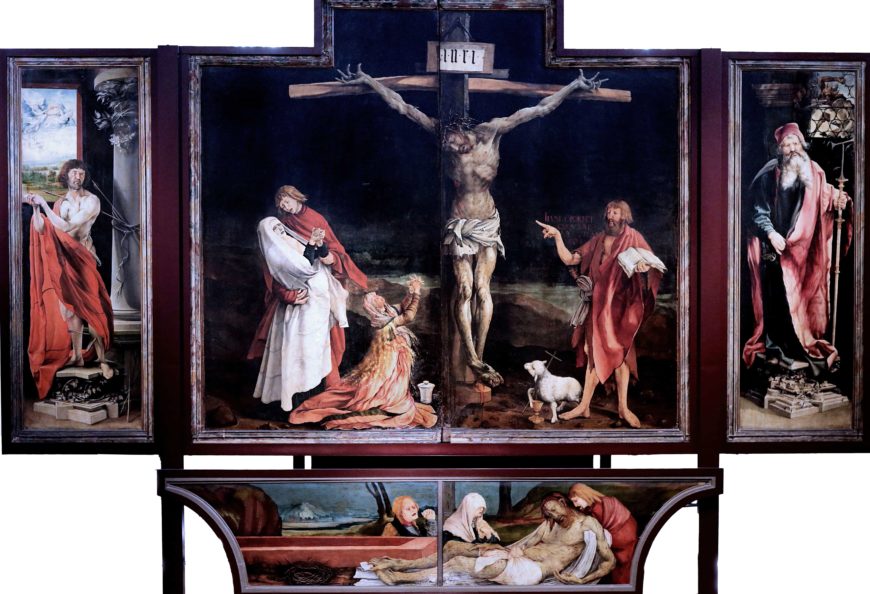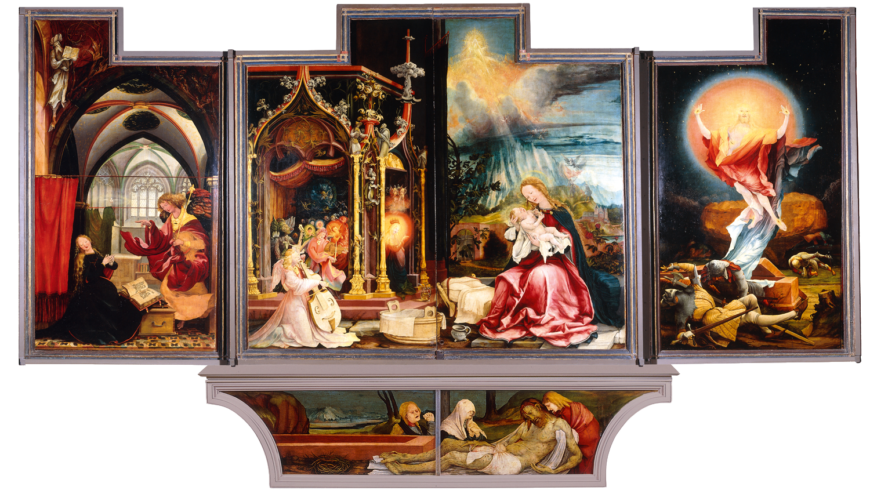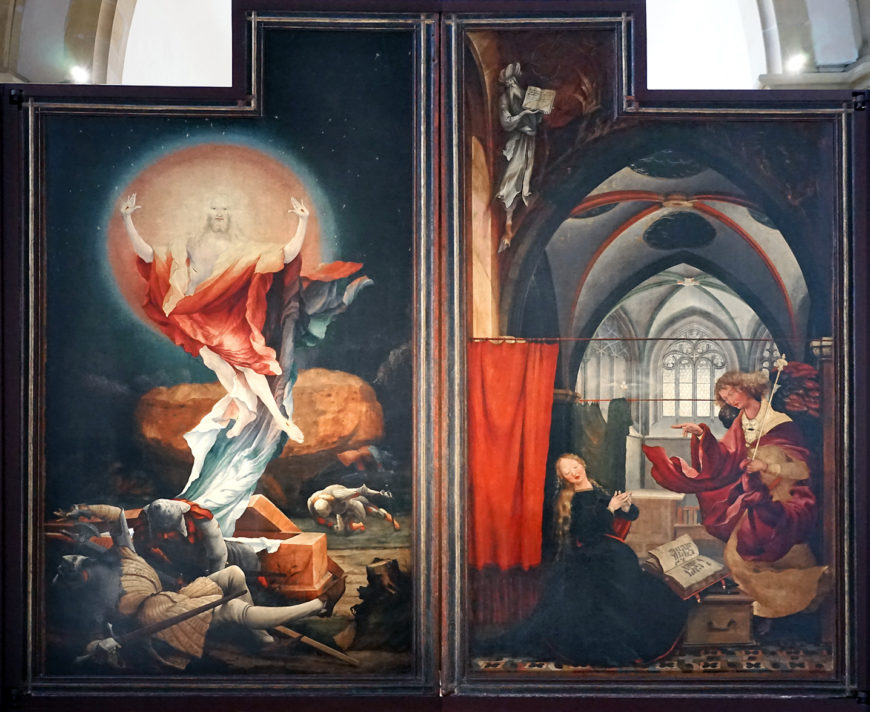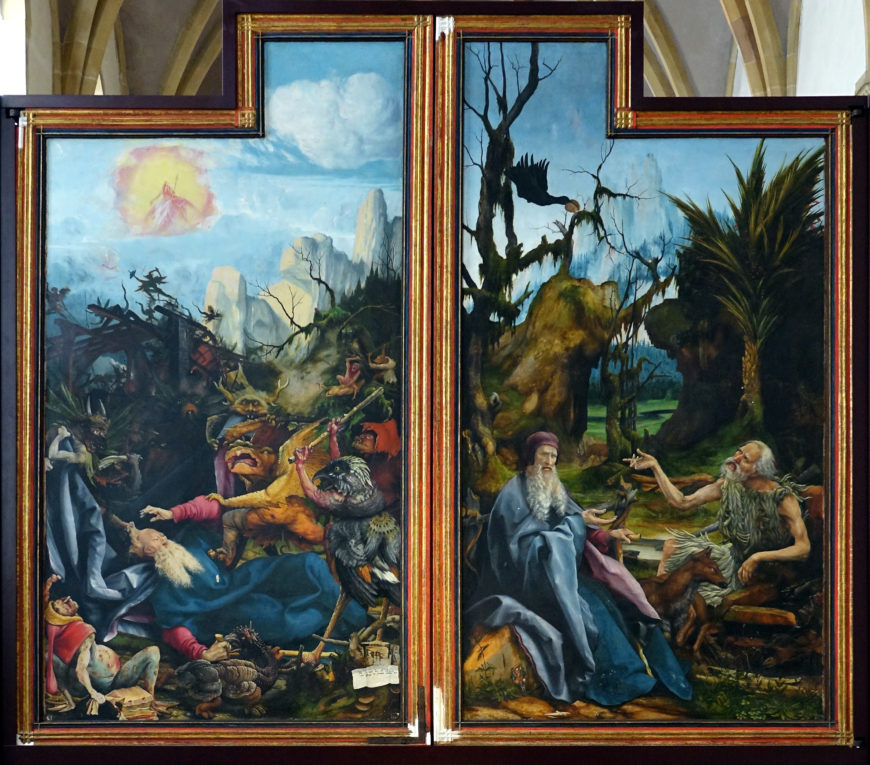Matthias Grünewald, Isenheim Altarpiece (closed), 1510–15
Matthias Grünewald, Isenheim Altarpiece (second position), 1510–15
Resurrection and Annunciation panels , Matthias Grünewald, Isenheim Altarpiece, 1510–15 (photo: Edelseider, CC BY 2.0)
Far left and far right panels seen when altarpiece is fully open (here illustrated sided-by-side). The Temptations of Saint Anthony (left), Anthony visited by Saint Paul (right), Matthias Grünewald, Isenheim Altarpiece, 1510–15 (photo: Gzen92, CC BY-SA 4.0)
Isenheim altarpieceMatthias Grünewald and Nicolas Haguenau. c. 1512-1516 C.E. Colmar, France. Oil on wood
Emphasizing the suffering and anguish of Christ and his mother's angst. With intense colors and dramatic lighting throughout, Grunewald included a Lamentation in the predella and Saints Sebastian and Anthony on the fixed wings.
Complete Identification:
Isenheim Altarpiece
Matthias Grünewald
1512-1516
Oil on wood
Christian, German
Germany (now in France)
Form:
Left picture
Left side: red robed figure stands next to Corinthian column
Middle:
Christ is centered and crucified
Very macabre and dramatic
Hanging down from the cross
On his left side are three people: two women looking up in anguish and one person holding the woman in white
On his right side is a red clothed man and a dog
Right side: red and blue clothed old, bearded man with a staff
Pradella:
Jesus’s dead body is being held by several people next to some sort of opening, possible a grave
Right Picture:
Left side: woman looking up at a Gothic architecture place to a robed figure
Middle:
Left: Woman in pink dress playing guitar-like instrument surrounded by smaller figures and instrument
Right: Mary and Christ-child in a landscape, blue sky and bright orange light (sun?)
Right side: figure rising divinely with a mandorla over bodies
Pradella: Same as the left picture → Christ’s body being held
Big! 9' 9 1/2" x 10' 9" (just center panel)
But she’s movable
Function:
Created to serve as the central object of devotion in an Isenheim hospital built by the Brothers of St. Anthony
Popular in Germany at the time
Facilitate public prayer
Fully opened on special occasions → helps to inspire hope
Content:
Left picture: panels is closed
Virgin is swooning into the arms of St. John the Evangelist
John the Baptist gestures towards Christ
Lamb of God is below him (metaphor for Christ himself)
not usually at crucifixion
Inclusion is symbolic, since he is considered as the last of the prophets to announce the coming of the Messiah
Mary Magdalene is just crying
Outside panels: St. Sebastian and then the St. Anthony Abbott
Right picture: panels are open
From left to right: Annunciation, Virgin and Child, Resurrection
Angels playing music celebrate the birth of the Christ child
resurrection (fireball— hovering over the sepulchre and the bodies of the sleeping soldiers, a combination of Transfiguration, Resurrection and Ascension.)
Both predellas show a Lamentation scene
Context:
Isenheim Hospital was run by Brothers of St. Anthony
St. Anthony was a patron saint of those suffering from skin diseases
Took care of sick and dying peasants at hospital
Christ was painted in such a macabre way to show them that he too suffered like they are now
Predella: the bottom part in the altarpieces
Cross-Cultural Connections:
Standard of Ur and Last Judgement of Hu-Nefer
Stories depicted in a sequential format
Hu-Nefer is of religious imagery and concerns itself with death
Themes:
Religion
Devotion
Power in society
Divine power
Power of the church




